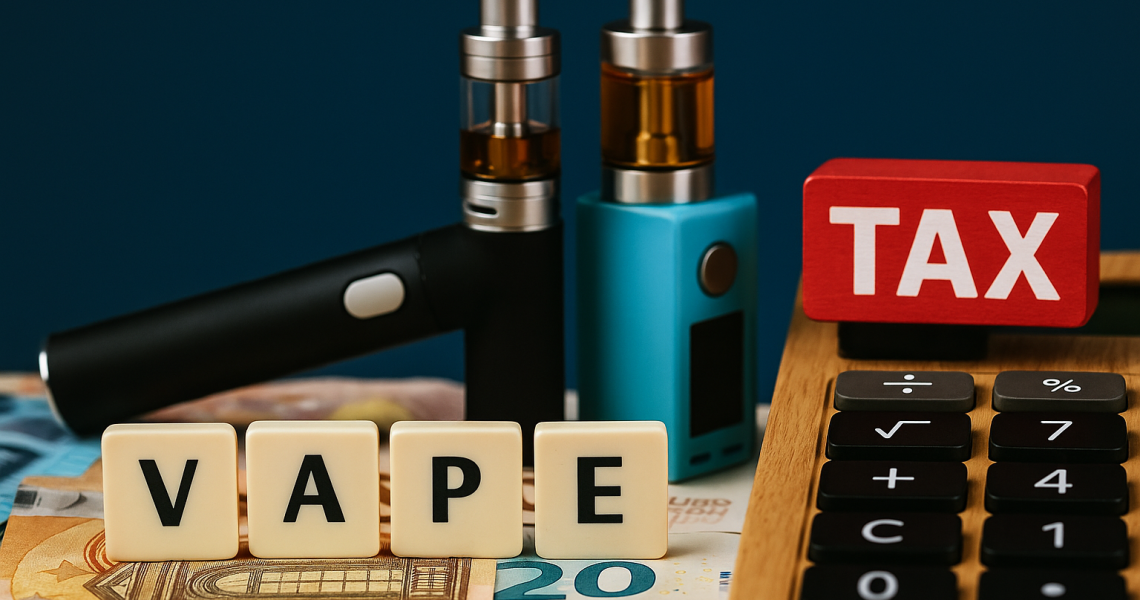The 2026 Finance Bill plans to revolutionize the world of vaping in France: taxation of e-liquids, a ban on online sales, and mandatory approval for stores. A series of measures that threaten a whole area of harm reduction.

A new tax for e-liquids
From 2026, each milliliter of e-liquid could be taxed at €0.03/mL for liquids up to 15 mg/mL nicotine, and €0.05/mL above that.
In other words, the price of a 50-mL bottle will rise from €1.50 to €2.50, gradually narrowing the cost gap between vaping and traditional cigarettes.
The authorities justify this taxation in the name of public health and tax harmonization. But vape professionals see it as an obstacle to access to a less harmful alternative for smokers.
Ban on online sales and compulsory approval
At the same time, article L. 3513-18-4 of the French Public Health Code, as proposed, prohibits distance selling of e-liquids to individuals.
The direct consequence is that online stores are totally excluded from the market, and only physical sales remain possible – but within an extremely restricted framework.
In addition, article L. 3513-18-2 stipulates that only an approved establishment, or tobacconists, will be able to sell these products – after verification of training, material resources and excise collection.
What impact will this have on specialist stores?
For vape-shops, whether independent or networked, the blow is hard.
- Many rely heavily on online sales: this is a major loss.
- Approval entails costs: specific software, administrative follow-up, training…
- The risk of closure or conversion is real.
An indirect benefit for tobacconists?
With this reform, tobacconists could become the only majority physical sellers of e-liquids.
In some rural or sparsely populated areas, this is tantamount to quasi-exclusivity.
But tobacconists don’t always have the skills or guidance that a vape professional offers. The risk: a decline in specialized offerings, a reduction in technical support, and for some ex-smokers, a return to traditional cigarettes.
A government scam for vapers?
This is the opinion shared by many players in the sector.
The benevolence displayed in terms of risk reduction comes up against high taxation and restricted distribution, which can push consumers towards parallel circuits or tobacco.
In this context, we can legitimately speak of a change in the rules of the game, which does little to benefit vapoteurs.
And for smokers who really want to quit?
For a long time, vape has been seen as a smoking cessation tool. With these measures, this role is undermined.
But there is another, complementary way: laser ear reflexology. laser auricular reflexology.
This is where MyLaserTabac comes in.
This gentle method acts directly on addiction mechanisms, via laser stimulations applied to the ear. It helps to release the desire to smoke, reduce the stress associated with quitting, and support a real break with tobacco.
For those who see vaping or substitutes as an imperfect alternative – or fear a return to smoking – this solution represents a real opportunity to wean themselves off tobacco for good.
Conclusion
The reform announced for 2026 is profoundly reshaping the landscape of vape in France. Heavy taxation, a ban on online sales, restrictions on distribution: the consequences are manifold and often unfavorable to users.
If you use vape as part of a weaning strategy, don’t lose sight of the fact that there are other methods available.
And if you want to go further, choose a supervised approach that’s adapted to your needs and geared towards freedom, the MyLaserTabac anti-smoking laser method is there to support you.
